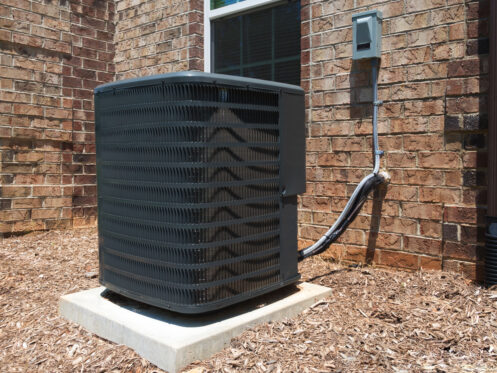Is your AC leaking water? This common issue can lead to serious problems if not addressed promptly. A leaking air conditioner not only affects its efficiency but can also cause damage to your home and make your family uncomfortable. Fixing it quickly is crucial to prevent further damage and make sure your AC works well.
In this article, we will explore:
- Common causes of an AC leaking water
- Troubleshooting steps to fix the issue
- Ways to prevent future leaks
Why Is Your AC Leaking Water?
There are several reasons why your AC might be leaking water. Understanding these causes can help you identify and fix the problem quickly. Here are some common reasons:
- Blocked Drain Pipes: When the condensate drain line is clogged, water can back up and leak out of the unit.
- Dirty Air Filters: Dirty filters can cause the evaporator coils to freeze and then melt, leading to water leakage.
- Low Refrigerant Levels: Low refrigerant can also cause the coils to freeze and then leak water when they thaw.
For more detailed information on HVAC system failures, you can refer to the article Five Common Causes of HVAC Failures – Climatech of Professional.
Beyond these primary causes, other specific issues can also lead to AC dripping water. These include:
- Clogged Condensate Drain Line: A common issue that can be resolved by cleaning the drain line.
- Broken Condensate Pump: If the pump is broken, it won’t be able to pump out the water, causing leaks.
- Improper Installation: Incorrect installation can cause various issues, including water leaks.
Identifying and resolving these issues promptly can prevent further damage and ensure your AC functions efficiently.
How to Fix an AC Leaking Water
If your AC is leaking water, there are several steps you can take to troubleshoot and fix the issue:
- Check and Clean the Condensate Drain Line:
- Turn off your AC unit.
- Locate the condensate drain line and use a wet/dry vacuum to clear any blockages.
- Flush the line with a mixture of water and vinegar to remove any remaining debris.
- Replace Air Filters:
- Turn off your AC unit.
- Remove the old air filter and replace it with a new one.
- Ensure the new filter is installed correctly to allow proper airflow.
- Inspect Refrigerant Levels:
- If you suspect low refrigerant levels, it’s best to call a professional to inspect and refill the refrigerant.
While some fixes can be done by homeowners, there are times when calling a professional is necessary. If you are unsure or the problem persists, it’s best to seek expert help to avoid further damage. For professional help, visit our Air Conditioner Repair page.
AC Vent Dripping Water: Causes and Solutions
When you notice water dripping from your AC vents, it can be a sign of underlying issues. This problem can lead to water damage and poor air quality if not addressed promptly. Here are some common causes and solutions:
Causes
- Poor Insulation: If the insulation around your ductwork is inadequate, it can cause condensation to form and drip.
- High Humidity: Excess moisture in the air can lead to condensation on your AC vents.
- Blocked Vents: If your vents are blocked, air cannot circulate properly, leading to moisture buildup.
Solutions
- Improve Insulation: Ensure your ductwork is properly insulated to prevent condensation.
- Use a Dehumidifier: A dehumidifier can help reduce humidity levels in your home, preventing condensation.
- Clear Blockages: Make sure your vents are not blocked by furniture or other objects to allow proper air circulation.
Ways to Prevent AC Leaking Water
Preventing water leaks from your AC unit is crucial to maintaining a comfortable and safe home environment. Here are some tips to help you avoid AC water leaks:
- Regular Maintenance: Schedule regular maintenance checks to ensure your AC unit is functioning properly. Professional inspections can catch potential issues early. Learn more about our AC Maintenance Services.
- Clean or Replace Air Filters: Dirty air filters can cause your AC to work harder, leading to potential leaks. Clean or replace filters regularly.
- Check Condensate Drain Line: Ensure the condensate drain line is clear of blockages. A clogged drain line is a common cause of leaks.
- Monitor Refrigerant Levels: Low refrigerant levels can cause your AC to freeze and then leak water when it melts. Keep an eye on refrigerant levels and refill as needed.
- Inspect Insulation: Proper insulation of ductwork and other components can prevent condensation and water leaks.
- Use a Programmable Thermostat: A programmable thermostat can help maintain consistent temperatures, reducing the risk of condensation.
For more information on preventing HVAC water damage, you can refer to Preventing HVAC Water Damage – PuroClean HQ. Additionally, learn about the importance of regular HVAC maintenance from Property Owners: HVAC Preventative Maintenance Is More Important Than Ever.
When to Call a Professional
While some AC issues can be resolved with a bit of DIY effort, there are times when calling a professional is the best course of action. Here are some scenarios where professional help is necessary:
- Persistent Leaks: If your AC continues to leak water despite your efforts, it may indicate a deeper issue that requires expert attention.
- Electrical Problems: Issues involving electrical components should always be handled by a professional to ensure safety.
- Refrigerant Leaks: Handling refrigerants requires specialized knowledge and equipment. A professional can safely address low refrigerant levels or leaks.
- Complex Repairs: If the problem is beyond your skill level, it’s best to call in an expert to avoid causing further damage.
Hiring a professional ensures that the job is done right and can save you time and money in the long run. Quality Cooling and Heating offers a range of services, including emergency repairs, to keep your home comfortable and safe. Contact us for expert HVAC and plumbing services.
Ensuring Indoor Air Quality
A leaking AC can negatively affect your indoor air quality. Here are some ways it can impact your home and tips to maintain good air quality:
- Mold and Mildew: Excess moisture from a leaking AC can lead to mold and mildew growth, which can cause health issues. Regularly check and clean your AC unit to prevent this.
- Humidity Levels: A leaking AC can disrupt the humidity balance in your home, making it uncomfortable. Ensure your AC is functioning properly to maintain optimal humidity levels.
- Air Filters: Dirty or clogged air filters can reduce air quality. Replace filters regularly to keep the air clean.
- Regular Maintenance: Schedule regular HVAC maintenance to ensure your system is running efficiently and to catch any potential issues early.
Maintaining good indoor air quality is essential for a healthy living environment. Regular HVAC maintenance from Quality Cooling and Heating can help ensure your system is operating at its best. For more tips on maintaining indoor air quality, visit our website.


